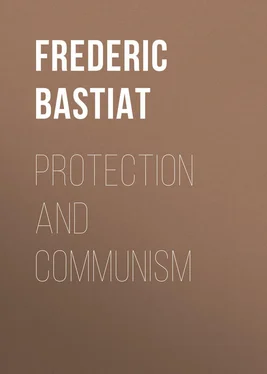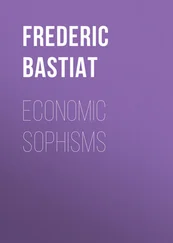Frederic Bastiat - Protection and Communism
Здесь есть возможность читать онлайн «Frederic Bastiat - Protection and Communism» — ознакомительный отрывок электронной книги совершенно бесплатно, а после прочтения отрывка купить полную версию. В некоторых случаях можно слушать аудио, скачать через торрент в формате fb2 и присутствует краткое содержание. ISBN: , Жанр: foreign_antique, foreign_prose, на английском языке. Описание произведения, (предисловие) а так же отзывы посетителей доступны на портале библиотеки ЛибКат.
- Название:Protection and Communism
- Автор:
- Жанр:
- Год:неизвестен
- ISBN:http://www.gutenberg.org/ebooks/44144
- Рейтинг книги:5 / 5. Голосов: 1
-
Избранное:Добавить в избранное
- Отзывы:
-
Ваша оценка:
- 100
- 1
- 2
- 3
- 4
- 5
Protection and Communism: краткое содержание, описание и аннотация
Предлагаем к чтению аннотацию, описание, краткое содержание или предисловие (зависит от того, что написал сам автор книги «Protection and Communism»). Если вы не нашли необходимую информацию о книге — напишите в комментариях, мы постараемся отыскать её.
Protection and Communism — читать онлайн ознакомительный отрывок
Ниже представлен текст книги, разбитый по страницам. Система сохранения места последней прочитанной страницы, позволяет с удобством читать онлайн бесплатно книгу «Protection and Communism», без необходимости каждый раз заново искать на чём Вы остановились. Поставьте закладку, и сможете в любой момент перейти на страницу, на которой закончили чтение.
Интервал:
Закладка:
'Look at our custom-house tariff? By their prohibitions, their differential taxes, their premiums, their combinations of all kinds, it is society which aids, which supports, which retards or advances all the combinations of national labour; it not only holds the balance between French labour, which it protects, and foreign labour, but on the soil of France itself it is perpetually interfering between the different interests of the country. Listen to the perpetual complaints made by one class against another: see, for example, those who employ iron in their processes, complaining of the protection given to French iron over foreign iron; those who employ flax or cotton thread, protesting against the protection granted to French thread, in opposition to the introduction of foreign thread; and it is thus with all the others. Society (it ought to be said, the government) finds itself then forcibly mixed up with all these struggles, with all the perplexities connected with the regulation of labour; it is always actively interfering between them, directly and indirectly, and from the moment that the question of custom duties is broached, you will see that you will be, in spite of yourselves, forced to acknowledge the fact and its cause, and to take on yourself the protection of every interest.
'The necessity which is thus imposed on the government to interfere in the question of labour, should not, then, be considered an objection to the debt which society owes to the poor workmen.'
And you will remark well that in his arguments, M. Billault has not the least intention of being sarcastic. He is no Free-trader, intentionally disguised for the purpose of exposing the inconsistency of the Protectionists. No; M. Billault is himself a Protectionist, bonâ fide . He aims at equalizing our fortunes by law. With this view, he considers the action of the tariffs useful; and being met by an obstacle – the right of property – he leaps over it, as you do. The right of labour is then pointed out to him, which is a second step in the same direction. He again encounters the right of property, and again he leaps over it; but turning round, he is surprised to see you do not follow him. He asks the reason. If you reply – I admit in principle that the law may violate property, but I find it inopportune that this should be done under the particular form of the right of labour, M. Billault would understand you, and discuss with you the secondary question of expediency. But you raise up, in opposition to his views, the principle of property itself. This astonishes him; and he conceives that he is entitled to say to you – Do not act with inconsistency, and deny the right of labour on the ground of its infringement of the right of property, since you violate this latter right by your tariffs, whenever you find it convenient to do so. He might add, with some reason, by the protective tariffs you often violate the property of the poor for the advantage of the rich. By the right of labour, you would violate the property of the rich to the advantage of the poor. By what chance does it happen that your scruples stop short at the point they do?
Between you and M. Billault there is only one point of difference. Both of you proceed in the same direction – that of Communism: only you have taken but one step, and he has taken two. On this account the advantage, in my eyes at least, is on your side; but you lose it on the ground of logic.
For since you go along with him, though more slowly than he does, he is sufficiently well pleased to have you as his follower. This is an inconsistency which M. Bitlault has managed to avoid, but, alas! to fall himself also into a sad dilemma! M. Billault is too enlightened not to feel, indistinctly perhaps, the danger of each step that he takes in the path which ends in Communism. He does not assume the ridiculous position of the champion of property, at the very moment of violating it; but how does he justify himself? He calls to his aid the favourite axiom of all who can reconcile two irreconcilable things — There are no fixed principles . Property, Communism – let us take a little from both, according to circumstances.
'To my mind, the pendulum of civilization which oscillates from the one principle to the other, according to the wants of the moment, but which always makes the greater progress if, after strongly inclining towards the absolute freedom of individual action, it fells back on the necessity of government interference.'
There is, then, no such thing as truth in the world. No principles exist, since the pendulum ought to oscillate from one principle to the other, according to the wants of the moment. Oh! metaphor, to what a point thou wouldst bring us, if allowed!
But as you have well said, in your place in the Assembly, one cannot discuss all parts of this subject at once, I will not at the present moment examine the system of Protection in the purely economic point of view. I do not inquire then whether, with regard to national wealth, it does more good than harm, or the reverse. The only point that I wish to prove is, that it is nothing else than a species of Communism. MM. Billault and Proudhon have commenced the proof, and I will try and complete it.
And first, What is to be understood by Communism? There are several modes, if not of realizing community of goods, at least of trying to do so. M. de Lamartine has reckoned four. You think that there are a thousand, and I am of your opinion. However, I believe that all these could be reduced under three general heads, of which one only, according to me, is truly dangerous.
First, it might occur to two or more men to combine their labour and their time. While they do not threaten the security, infringe the liberty, or usurp the property of others, neither directly nor indirectly, if they do any mischief, they do it to themselves. The tendency of such men will be always to attempt in remote places the realization of their dream. Whoever has reflected upon these matters knows these enthusiasts will probably perish from want, victims to their illusions. In our times, Communists of this description have given to their imaginary elysium the name of Icaria, 4 4 This, as most of our readers are aware, is an imaginary country at the other side of the world, where a state of circumstances is supposed to exist productive of general happiness – moral and physical – to all. The chief creator of this modern Utopia, from which indeed the idea is confessedly taken, is M. Cabet, whose book was published during the year of the late revolution in France. It is meant to be a grave essay on possible things, but could only be considered so, we venture to think, in Paris, and only there in times of unusual excitement. The means by which M. Cabet and his followers suppose their peculiar society could be established and maintained, are beyond conception false, ludicrous, and puerile. M. Cabet was obliged to leave France for a grave offence, but found a refuge and no inconsiderable number of followers in America, where, by the side of much that is excellent and hopeful, flourishes, perhaps, under present circumstances, as a necessary parallel, many of the wild and exploded theories of the world.
as if they had had a melancholy presentiment of the frightful end towards which they were hastening. We may lament over their blindness; we should try to rescue them if they were in a state to hear us, but society has nothing to fear from their chimeras.
Конец ознакомительного фрагмента.
Текст предоставлен ООО «ЛитРес».
Прочитайте эту книгу целиком, купив полную легальную версию на ЛитРес.
Читать дальшеИнтервал:
Закладка:
Похожие книги на «Protection and Communism»
Представляем Вашему вниманию похожие книги на «Protection and Communism» списком для выбора. Мы отобрали схожую по названию и смыслу литературу в надежде предоставить читателям больше вариантов отыскать новые, интересные, ещё непрочитанные произведения.
Обсуждение, отзывы о книге «Protection and Communism» и просто собственные мнения читателей. Оставьте ваши комментарии, напишите, что Вы думаете о произведении, его смысле или главных героях. Укажите что конкретно понравилось, а что нет, и почему Вы так считаете.












